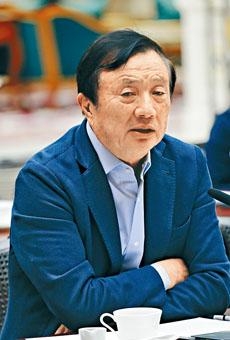
1/1 Huawei founder Ren Zhengfei.
The judicial department documents released by the U.S. Department of Justice yesterday did not mention Huawei founder Ren Zhengfei, but for the first time, without naming him, he alleged that Ren Zhengfei had been interviewed by the FBI and made three ""falsely stated", denying that the company has business dealings with Iran. The indictment issued by the Federal District Court for the Eastern District of New York mentioned that Huawei had repeatedly misled the U.S. government and multiple banking institutions since June 2007 in an attempt to conceal Huawei's business dealings with Iran.The indictment states that the FBI interviewed Huawei's founder in July 2007.However, the indictment did not name Ren Zhengfei, only calling him ipidual-1 (Individual No. 1), but stated that a New York grand jury had learned his identity. The indictment stated that when Ren Zhengfei was questioned by the FBI, he said he was willing to provide more Huawei information, but made multiple "false statements", including claiming that Huawei had not engaged in activities that violated U.S. export laws and that Huawei operated in compliance with U.S. export laws.In addition, Ren Zhengfei also stated that Huawei has not directly contacted Iranian companies, but he believes that Huawei may have sold equipment to third parties such as Egypt, and ultimately these equipment may have been resold to Iran. The indictment also mentioned that Huawei had repeatedly misled financial institutions in the United States and Europe, saying that Huawei had told one of the financial institutions that it would not handle Iranian business through its systems.However, Huawei has used the agency's U.S. subsidiaries and other U.S. financial institutions to process settlement transactions involving millions of dollars to promote Huawei's business in Iran, and some transactions were completed in the Eastern District of New York. The United States indicts Huawei on 23 counts and China urges an end to unreasonable suppression The U.S. Department of Justice announced on Monday that it had filed a criminal indictment against Huawei Group Vice Chairman Meng Wanzhou, Huawei and its two subsidiaries, charging it with 23 crimes, including telecommunications and bank fraud., stealing trade secrets, obstructing justice, and violating U.S. sanctions on Iran. At the same time, he formally applied to Canada for the extradition of Meng Wanzhou.The United States dispatched 11 senior officials to hold a press conference and denounced Huawei for "shamelessly abusing American companies and financial institutions and threatening the global market."Huawei denies all accusations. The Chinese Ministry of Foreign Affairs strongly urges the United States to stop its unreasonable suppression of Chinese companies including Huawei, withdraw the arrest warrant and extradition request for Meng Wanzhou, and avoid going further down the wrong path. Eleven U.S. officials including Acting Attorney General Wade Garrison, Commerce Secretary Ross, FBI Director Christopher Wray, and Homeland Security Secretary Nielsen held an interagency press conference to announce a total of two charges against Meng Wanzhou, Huawei and two Huawei subsidiaries.Thirteen counts. Among them, the 13th indictment filed by the New York prosecutors mainly accuses Huawei, Meng Wanzhou and their Hong Kong shell company Skycom Tech of committing telecommunications and bank fraud from 2007 to 2017; Huawei andIts U.S. subsidiary was accused of obstructing the investigation.The charges accuse Meng Wanzhou, Huawei and its subsidiaries of concealing trade with Iran and violating U.S. and United Nations sanctions imposed on Iran.Meng Wanzhou has been accused of repeatedly misleading U.S. banks and judicial investigations by relevant departments. There are ten indictments brought by the Seattle grand jury, mainly accusing two Huawei subsidiaries of allegedly stealing technology from the American technology company T-Mobile's smartphone testing robot "Tappy" from 2012 to 2014.The Justice Department said it had internal Huawei emails as evidence, including the bonuses Huawei paid to employees who successfully stole secrets. "These charges expose Huawei's blatant and ongoing actions to take advantage of American companies and financial institutions, posing a threat to free and fair global markets," Christopher Wray said. "As a country, we must carefully consider Huawei's actions.The risks posed by companies. The FBI will not and will not tolerate companies violating our laws, obstructing our justice, and jeopardizing our national security." Acting Minister of Justice Wedega announced at a press conference that the United States will submit documents for the extradition of Meng Wanzhou to Canada.Forty-seven-year-old Meng Wanzhou is the eldest daughter of Huawei founder Ren Zhengfei and serves as Huawei's vice chairman and chief financial officer.She was arrested while crossing the border in Vancouver on December 1 last year and is currently on bail in Vancouver, waiting to appear in court next month.Neither she nor her lawyer responded to the US action yesterday. The Chinese Ministry of Foreign Affairs stated yesterday that it strongly urges the United States to immediately revoke the arrest warrant for Meng Wanzhou and not to issue a formal extradition request.The Ministry of Foreign Affairs stated that the United States uses state power to discredit and attack specific Chinese companies in an attempt to stifle the legitimate and legal operations of the companies. There are strong political intentions and political manipulation behind it.China also urges Canada to immediately release Meng Wanzhou and not to pull chestnuts from the fire for the United States. China will also resolutely defend the legitimate and legitimate rights and interests of Chinese companies. In response to the US accusations against Meng Wanzhou and Huawei, Huawei issued only a brief response yesterday, saying it was "very disappointed."Huawei said that after Meng Wanzhou was arrested in Canada, Huawei tried to discuss relevant charges with the U.S. Department of Justice, but was rejected.The civil lawsuit regarding the alleged theft of a Chinese subsidiary from an American technology company has long been settled. Huawei emphasized that it is not guilty of all the charges it has been accused of, and it is not aware of any wrongdoing by Meng Wanzhou. It believes that the U.S. court will eventually reach the same conclusion.



